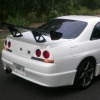Is Power (rwkw) Figure Everything? Why Are People So Hung Up On Kw Figures
Announcements
-
Latest Posts
-
I'm not up to date on the latest, but for basic modifications like pod filter, lower springs etc you can get a modification permit at the time of inspection. For more serious modifications you will need engineering. Intercoolers used to fall into the mod permit rule but its been a long while since i looked it up. Either way you will be able to get it registered, just a case of $300 vs $3k .
-
Hi everyone! I’m the new owner of a 1996 R33 GTS-T, I’ve purchased this car over from Queensland and brought it to Western Australia and I’ve found that there is a hole cut out in the engine bay for the FMIC that enters into the wheel well (fender liners are in the boot). For anyone that has had to get their car over the PITS here, will this be a major issue?
-
Yeah I've spotted this one too, whenever it's lotto superdraw week and I'm browsing car sales dot com for my new ride They must be dreaming, maybe it's worth 150k for the link to Brock?
-
100% accurate! We are a pack of know it alls.... But, I bet people go to you when they have a problem! I've been on a bit of a clean up rampage too over the past month! I've thrown more shit in the bin over the past 2 weeks than I have in the past 3 years combined! Anyway, it's all good fun being different! My wife sometimes does not agree!
-
ADHD in all form isn't about "can focus, or can't focus" or is hyper active or isn't etc. It's all a dysregulation. Either time feels to be stationary, or time just vanishes in a split second. We are either under focussed on the task at hand (as we're over focussed on our surroundings) or we have no idea an atomic bomb went off beside us as we're so hyper focussed and locked in on things. Not to mention the rapid fire thought process. What it takes a "normal" process to think up a solution to a problem, ADHD will be able to give you 5 different ways to solve the problem, and the pros and cons of each. While we can be highly impulsive and lack the ability to "control ourselves" we can also become paralysed with the inability to make a decision for ourselves. While most of us have an OCD like requirement for perfection, we lack the ability often to remain focussed to get things to a perfect state. Those with undiagnosed ADHD as adults, can often find the last part actually stops them ever attempting to do things that they have the ability to do, as the reasoning is often "if I can't do it perfectly, it's not worth doing" As for projects... Ha ha ha, I still need to take the other half of my wall trim down in the Fiance's office so I can paint it. Need to finish digging and running the back yard drains, my R33, getting the Ninja bike registered (now being sold), the moped project, fixing either of the lawn mowers so they're reliable, along with a myriad of other things. It's why I've been going through lately and just being brutal and clearing projects off that I won't actually ever complete. IE, moped will go to the tip, or be given away, bike is being sold, Subaru project being sold, some parts for other projects given away. Or I've been making myself focus on one thing at a time, by ticking off the smallest quickest ones first. There's also a reason by our mid twenties we seem to be "know it alls", as we've all been down some of the weirdest and oddest rabbit holes when you follow the dopamine trail. It's often also why we're more a jack of all trades, but not a master of one. However, pretty much all of my hobby projects, in one way or another, all come back around to automotive. That's my zen area.
-






Recommended Posts
Create an account or sign in to comment
You need to be a member in order to leave a comment
Create an account
Sign up for a new account in our community. It's easy!
Register a new accountSign in
Already have an account? Sign in here.
Sign In Now